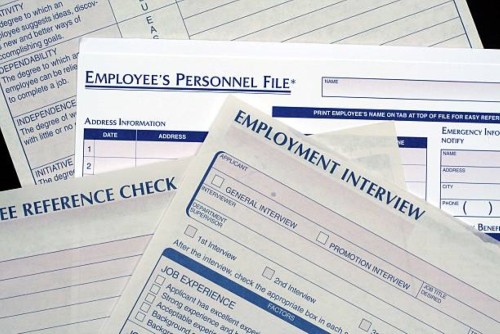Ensuring Compliance: A Comprehensive Personnel File Checklist for Employers
Personnel files are an essential part of any organization’s human resources department. These files contain important information about employees, such as their employment history, performance evaluations, and disciplinary actions.
Compliance with personnel file regulations is crucial for employers to ensure that they are meeting legal requirements and protecting the privacy and confidentiality of their employees.
Compliance with personnel file regulations involves adhering to federal and state laws that govern the creation, maintenance, and access of these files. Failure to comply with these regulations can result in legal consequences for employers, including fines and penalties. It is therefore essential for employers to understand the legal requirements for personnel files and take steps to ensure compliance.
Essential Information to Include in Personnel Files

Personnel files should contain a variety of information that is essential for managing employees effectively.
This includes basic information such as:
- the employee’s name
- address
- contact information
It should also include employment-related documents such as job applications, resumes, offer letters, and employment contracts.
Performance evaluations are another important component of personnel files as they provide a record of an employee’s performance over time.
These evaluations can be used to determine promotions, salary increases, or disciplinary actions. Disciplinary actions should also be documented in personnel files, including any warnings or reprimands given to employees.
Maintaining Confidentiality and Privacy of Personnel Files

Maintaining the confidentiality and privacy of personnel files is crucial for protecting the rights of employees and complying with legal requirements.
Personnel files should be stored in a secure location, such as a locked filing cabinet or password-protected electronic system. Access to these files should be limited to authorized personnel only.
With digital transformation on the way, we should start digitizing our employee’s personnel files to streamline our HR processes and ensure compliance with data management regulations.
Crown’s personnel file management service offers a comprehensive solution that not only digitizes and securely stores employee records but also provides advanced search capabilities, version control, and customizable access permissions.
It is also important to establish clear policies and procedures for accessing and handling personnel files. Only individuals who have a legitimate need to access the files should be granted permission to do so. Employees should be made aware of their rights regarding their personal information and how it will be used and protected.
Guidelines for Accessing and Sharing Personnel Files
Access to personnel files should be limited to individuals who have a legitimate need for the information contained within them. This typically includes human resources staff, supervisors, and managers who are responsible for making employment-related decisions. Other employees should only have access to their own personnel files.
When sharing personnel files with third parties, such as government agencies or legal counsel, it is important to ensure that the information is shared securely and in compliance with applicable laws. This may involve redacting certain sensitive information or obtaining written consent from the employee before sharing their file.
Here are some good tips for effectively managing employee personnel files.
Record Keeping and Retention Policies for Personnel Files
Establishing record keeping and retention policies for personnel files is essential for ensuring compliance with legal requirements. These policies should outline how long personnel files will be retained and how they will be disposed of once they are no longer needed.
Retention periods may vary depending on the type of information contained in the file and applicable state laws.
In India, employers are required to retain personnel files after an employee’s termination for a specific period. According to the information gathered from various sources:
- Employee records related to employment or personnel information should be retained for at least 8 years.
- As per Section 13A of the Wages Act, employee records should be kept for three years after the last payroll entry in India.
- Additionally, Indian labour and employment laws mandate that employers preserve employee records for a certain period, typically around three years.
Therefore, based on the regulations and guidelines in India, employers should retain personnel files for at least 3 to 8 years after an employee’s termination to comply with legal requirements.
It is important to consult with legal counsel or refer to state-specific guidelines to determine the appropriate retention period for personnel files.
Common Mistakes Employers Make with Personnel Files
There are several common mistakes that employers make when it comes to personnel files, which can result in non-compliance with regulations. One common mistake is failing to include essential information in personnel files, such as employment contracts or performance evaluations. This can make it difficult to track an employee’s history and can lead to legal issues if disputes arise.
Another common mistake is failing to maintain the confidentiality and privacy of personnel files. This can include allowing unauthorized individuals to access the files or failing to secure them properly. These mistakes can result in breaches of privacy and potential legal consequences for employers.
Digitizing personnel files is crucial in addressing these common mistakes and ensuring compliance with regulations.
By digitizing employee records through a service like Crown’s p-file management, essential information such as employment contracts and performance evaluations can be easily stored, organized, and accessed when needed.
Learn all the benefits of digital personnel file management here.
This eliminates the risk of omitting crucial documents and ensures a comprehensive record of each employee’s history, mitigating potential legal disputes.
Moreover, digitization enhances confidentiality and privacy by implementing robust security measures to safeguard sensitive information.
With controlled access permissions and encryption protocols, unauthorized individuals are prevented from accessing personnel files, reducing the risk of privacy breaches and protecting the employer from legal repercussions.
Therefore, embracing p-file digitization not only enhances efficiency in HR processes but also safeguards organizational compliance and minimizes legal liabilities associated with personnel file management.
Best Practices for Auditing and Reviewing Personnel Files
Regularly auditing and reviewing personnel files is an important best practice for ensuring compliance with regulations and maintaining accurate and up-to-date records.
Audits should be conducted regularly to ensure that all required information is included in personnel files and that they are being maintained by legal requirements.
During the audit process, it is important to review each employee’s file for accuracy and completeness.
Any missing or outdated information should be obtained or updated as necessary. It is also important to ensure that any changes or updates to personnel files are documented properly.
Remedies for Non-Compliance with Personnel File Regulations
Non-compliance with personnel file regulations can have serious consequences for employers. These consequences can include fines, penalties, and legal action by employees.
In some cases, non-compliance can also result in damage to an employer’s reputation and loss of trust from employees.
To remedy non-compliance, employers should take immediate corrective action.
This may involve updating personnel files to ensure they are complete and accurate, implementing new policies and procedures to ensure compliance, and providing training to employees on their rights and responsibilities regarding personnel files.
Importance of Compliance with Personnel File Requirements
Compliance with personnel file requirements is essential for employers to protect the rights of their employees and ensure that they are meeting legal obligations. Failure to comply with these requirements can result in legal consequences and damage to an employer’s reputation.
Employers should take the time to understand the legal requirements for personnel files and implement best practices for creating, maintaining, and accessing these files.
Regular audits and reviews should be conducted to ensure compliance and address any issues that arise. By prioritizing compliance with personnel file regulations, employers can create a positive and legally compliant work environment for their employees.
Download your essential file checklist now!
Unlock the potential of organized efficiency with our personnel file checklist.
Designed to streamline your HR administrative processes, this checklist empowers you to effortlessly manage and maintain essential employee documentation.
With our checklist in hand, you’ll navigate audits with ease and demonstrate your commitment to organizational excellence.
Take control today by downloading our personnel file checklist and experience the transformation firsthand.










